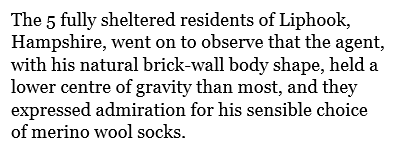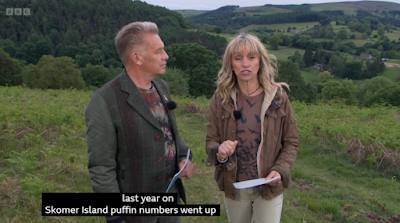Yes, friends, did you see Yours Truly in the paper this morning? Bet you did a double-take seeing that iconic picutre, didn't you! "That guy did look kind of familiar, now you come to mention it!", I hear you cry! [source: Onion News].
And did you recognise the woman in the Onion's picture this morning?
Yes, step forward, my medium-to-long-suffering wife Lois! Fame for her now, at last - and long overdue, may I add! [No, we haven't got time! - Ed]
mine and Lois's somewhat spooky walk this morning,
in freak weather conditions, over Old Man Lowsley's Farm:
winds reached speeds as high as 16mph, and only 3 birds were out
But little did Lois and I know, however, as we walked through this windy wilderness just outside our new home-town of Liphook, Hampshire, that this was destined to be "the best part of our day". Hard to believe isn't it.
And I blame myself for not reading the paper's afternoon edition carefully enough when, tired after our wind-affected walk, Lois and I lunched together at home with another tongue sandwich. In my defence, I think I was distracted by the paper's "lead" this lunchtime, with its news of another shocking theft from the Dorm Study Area.
Well that anonymous astrologist [sic!] was right on the button, as it turned out (!).
And yes, you've guessed it - it's been another arduous afternoon for Lois and me, while our new dentist, Portuguese-born New Zealander José, subjected us both to more of his kindly, well-meaning, but slow, professional torture (!) in his "chair of horrors" (!).
me in our new dentist's waiting room, while our new dentist
himself, Portuguese-born New Zealander José, was busy giving
Lois a good "going over" in his "chair of horrors" (!)
Lois got off lightly, with just 30 minutes in the "c.o.h" as we call it (!), but I was there for an hour and a half. What madness!!!!!
Awful afternoon, but there was an unexpected bright spot. As a long-time "language buff", I was able to sort out an amusing language problem affecting José and his dental assistant. José had apparently asked the woman to find him "a decent pin" in the office, and when she came back saying she couldn't find one, I explained that José in fact meant a pen - it was just his "Kiwi twang" that was causing the difficulty.
And I think that both José and the woman appreciated my quick "run through" of New Zealand vowel sounds, and their history, explaining the "short front vowel shift", giving due weight to the influence of all the Scottish settlers who went out there in the 19th century. The lecture had to be a fairly basic one, because I didn't have my slides with me, which was a pity.
Also, I had, like, a billion dental tools sticking in my mouth, which didn't help much either, to put it mildly !!!!!
How we laughed, though!
And I feel that my remarks this afternoon were a big step forward as regards the "easement" of the tricky staff relations at the surgery. I'm sure, also, that both José and his assistant will remember my visit for a long time to come.
[Yes, but not in a good way, Colin. Just saying! - Ed]
21:00 Our dental injections now starting to wear off, Lois and I go to bed on tonight's edition of Springwatch, the series that gives an overview of the current state of wildlife in the UK through a team of presenters reporting live from forests, heaths and moorlands around the country.
It's a wonderful start to the programme tonight, however, because Michaela is showcasing photos of puffins that viewers have sent in, "the UK's cutest sea-bird", and that's official (!).
Lois and I didn't know that puffin numbers are a crucial indicator when it comes to the health of the UK's marine life. Puffins are pretty much dependent on sand eels. Numbers of sand eels have been declining - as much as 80% compared to the 1970's. All a consequence of the UK's membership of the EU.
It was in the 1970's that industrial eel fishing really got going in UK waters, mainly the result of the actions of the Danish fishing fleet, which was "hoovering up" the North Sea's sand-eels with their ruthlessly efficient bottom-towed gear. The Danes were using their sand-eel catch for making fishmeal and oil, which are then used as feed for farmed fish and livestock. However, this activity was also slowly killing off the UK's puffin population.
Danish fishing boats, "slowly killing off
the UK's puffin population"
In the year 2000, the UK tried to set up an advisory no sand-eel fishing zone, but it wasn't very successful, explains presenter Chris Packham. And in 2023, when the UK finally announced a total ban, the EU's fishermen complained and took us to court. The UK Government stood up to them, however, and the ban remains in place, and since then puffin numbers have been going up again.
Unfortunately presenter Chris gets a bit carried away at this point - oh dear (!).
All right, get off your soapbox, Chris, and get on with the programme!
Will this do?
[Oh just go to bed! - Ed]
22:00 We go to bed - zzzzzz!!!!!





















No comments:
Post a Comment